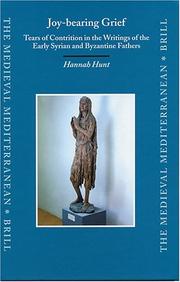| Listing 1 - 2 of 2 |
Sort by
|
Book
ISSN: 00823589 ISBN: 9783110258493 9783110258509 3110258498 3110258501 9786613599858 1280570253 Year: 2012 Volume: 168 Publisher: Berlin: de Gruyter,
Abstract | Keywords | Export | Availability | Bookmark
 Loading...
Loading...Choose an application
- Reference Manager
- EndNote
- RefWorks (Direct export to RefWorks)
Für die Analyse des spätantiken Geisteslebens, das durch den Zusammenbruch der Reichsstruktur und den Siegeszug des Christentums bestimmt ist, wird es wichtig, die Gedankengänge der griechischen Kirchenväter (etwa des Basileios) auch mit Hilfe lateinischer Übersetzungen teils zu rekonstruieren (Origenes), teils neu zu interpretieren (Kappadokier). Nur wenige Texte sind sowohl in der Quellsprache als auch in einer Zielsprache erhalten und kritisch ediert. Die dritte Homilie von Basileios ist aber als Rufins homilia secunda Basilii in beiden Fassungen vollständig zugänglich.Für Theologie wie Philologie ist entscheidend, wie die lateinischen Übersetzer zu beurteilen sind: Muss etwa Rufin von Aquileia als treuer Übersetzer oder als relativ freier Bearbeiter gewürdigt werden? Verschiebt sich die Trinitätstheologie beim Übertragungsprozess in den Westen?Zum Verständnis solcher Übersetzungsliteratur haben Theologie und Philologie bisher wenig beigetragen. Es fehlen vor allem textkritische und literarische Untersuchungen. In diese Lücke tritt der vorliegende Kommentar.
Sermons --- Christian literature, Early --- Sermons. --- Christian literature, Early. --- 276 =75 BASILIUS MAGNUS --- Early Christian literature --- Patristic literature --- Christian sermons --- Homilies --- Sermonettes --- Christian literature --- Griekse patrologie--BASILIUS MAGNUS --- Basil, --- Rufinus, --- Basil. --- Greek Church Fathers. --- History of Texts. --- Late Antiquity. --- Rufinus.

ISBN: 9004141235 9789004141230 9786610867233 1429429151 9047406451 128086723X 1433706865 9781429429153 9781433706868 9781280867231 6610867232 9789047406457 Year: 2004 Volume: 57 Publisher: Leiden Boston Brill
Abstract | Keywords | Export | Availability | Bookmark
 Loading...
Loading...Choose an application
- Reference Manager
- EndNote
- RefWorks (Direct export to RefWorks)
This volume is the first full-length study of penthos (tears of contrition) since Hausherr's in 1944. It traces its exposition in the early eastern Christian tradition, through detailed analysis of Greek and Syriac texts by Klimakos, Ephrem, Isaac and Symeon the New Theologian. It suggests why such weeping is, for these writers, a joyful as well as a sobering experience, and it places their writings in their historical and geographical context, giving some lexicographical background. Issues of religious anthropology, and the unusual choice of a female exegete in the person of the 'sinful woman' (Luke 7.36-50) are considered. The conclusion points the way to an appropriate theological interpretation of these teachings and highlights modern, non-monastic examples of joy-bearing, penitent grief.
Repentance --- Crying --- Fathers of the church, Greek --- Christianity --- History of doctrines --- Religious aspects --- Orthodox Eastern Church --- Doctrines --- History --- Fathers of the church [Greek ] --- Fathers of the church [Syriac ] --- Greek church fathers --- Griekse kerkvaders --- Kerkvaders [Griekse ] --- Kerkvaders [Syrische ] --- Pères de l'Eglise grecs --- Pères de l'Eglise syriaques --- 276 =923 --- Syrische patrologie --- Fathers of the church, Syriac --- Attrition --- Contrition --- Penitence --- Sin --- Penance --- Syriac Fathers of the church --- Greek fathers of the church --- Weeping --- Emotions --- Nonverbal communication --- Religious aspects&delete& --- Christianity&delete& --- History. --- Repentance - Christianity - History of doctrines --- Crying - Religious aspects - Christianity - History of doctrines --- Fathers of the church, Greek. --- History of doctrines. --- Fathers of the church, Syriac.
| Listing 1 - 2 of 2 |
Sort by
|

 Search
Search Feedback
Feedback About UniCat
About UniCat  Help
Help News
News